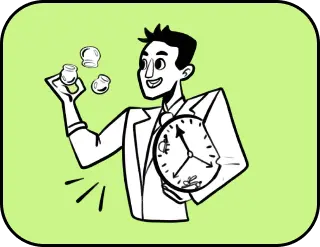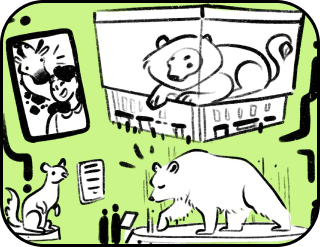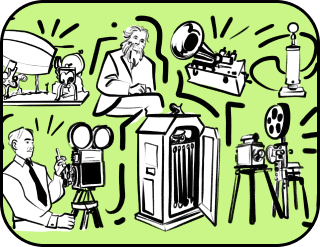Category: Life technologies
How introverts can enjoy work
“The secret to life is to put yourself in the right lighting. For some, it’s a Broadway spotlight; for others, it’s a desk lamp”
Susan Cain, author of Quiet: The Power of Introverts
“We are hiring! A large and growing company with a friendly team is looking for a versatile specialist. We offer: a high salary, team-building activities inside and outside the office, constant communication, and a true atmosphere of friendship.” What a great job opening! And yet, if just reading this listing has already drained half of your social battery, while an inner alarm bell rings: “Run! They’ll be talking to you all the time!”—chances are, you’re an introvert. But even introverts need to go to work.
So how do you make “team players” understand that your ability to work deeply and independently is not a weakness but a superpower for the company? How do you shift from being “that quiet, slightly odd colleague” to becoming “the valued expert everyone turns to for wise advice”? How do you ensure your work is judged by results, not by how much noise you make in the open space?
This tricky challenge has two solutions—and they might surprise you.
Leave yourself alone.
For a long time, society held the stereotype that the ideal employee is an extrovert: someone who draws energy from constant interaction and shines during lively brainstorming sessions. Against this bright backdrop, introverts were often seen as “strange” or “not team-oriented enough.”
While one introvert may need to recharge their social battery a hundred times a day just to make a single phone call, several extroverts will have already finished their work plan—and still found time to go clubbing together after hours. So wouldn’t it be easier to isolate introverts completely, give them the solitude they supposedly crave, and hire only extroverts?
No, it wouldn’t.
Despite their natural reserve, introverts often turn out to be outstanding employees. Their ability to focus deeply and reflect inwardly makes them highly effective at solving problems and tackling complex tasks. They also tend to have a creative mindset, allowing them to find unconventional solutions in almost any situation. Thanks to their heightened sense of responsibility, they nearly always reach their goals and deliver work on time. Unlike extroverts, who enjoy juggling multiple tasks, introverts usually concentrate on one thing at a time, which means fewer mistakes and higher quality results.
But still—how can you withstand the pressure of sociable colleagues and learn to actually enjoy your work if you don’t fit into the common concepts of this world?
Start with something simple. For example, stop bothering yourself.
Quit thinking there’s something wrong with you: you don’t need to act differently to earn respect in society. Your strength lies within, and introversion is not a flaw to be eradicated—it’s one of your greatest assets.
For extroverts, a morning chat with colleagues is like the first cup of coffee for many of us: a necessary ritual to kickstart the day, a source of energy and momentum. Their brains work best in interaction mode, so “small talk” is as essential a warm-up for them as a few quiet minutes with tea might be for a mother of several children.
Your way is different: you recharge through your favorite music in your headphones, the silence of your office, the sound of rain tapping on the windowsill, or watering the cactus on your desk. You don’t need anyone else’s energy to feel alive—you know how to draw it from within yourself. Extroverts, in this sense, are dependent on others: without an exchange of ideas, they struggle to function. Introverts, on the other hand, are self-sufficient. Score one–zero in your favor.
Take Energy Breaks.
And no, this doesn’t mean sneaking out of the office every hour for your tenth cup of coffee. Create your own system for rebooting your brain—one that only you know about. For instance, try the 30/5 method: thirty minutes of focused work followed by five minutes of rest, with your attention turned inward. Close your eyes and imagine yourself not in a stuffy office, but in your own cozy place of peace. Or switch off your thoughts entirely and simply gaze out the window. Of course, there’s always the risk of stretching your break beyond five minutes, but you can set a timer with an alert on your phone, computer, or smartwatch to make sure you’re back on track before your boss suspects anything. This approach helps you recharge, restore your strength, and find balance within yourself.
Surround Yourself with Pleasant Little Things.
Fill your desk with items you love: photos, toys, plants, or collectible figurines. No one will forbid you from bringing a piece of home comfort to your workplace.
Prepare for Important Conversations in Advance.
Nothing terrifies introverts more than having to speak up at team meetings in front of the entire office. In those moments, your entire vocabulary seems to vanish, your palms get sweaty, and your inner voice suggests you should urgently retrain as a forest hermit.
Be smarter than that.
If you know the meeting topic ahead of time, draft your talking points in advance and rehearse them at home in front of a mirror. When it’s time to speak, focus your attention on the one colleague who gives you the most positive vibes, and imagine you’re sharing your thoughts exclusively with them. And if the discussion shifts to questions you’re not ready for, keep a short list of “work-ready” phrases at hand—lines that can earn you respect and spark interest in what you have to say. For example: “I’ve dug deeply into this material and reached some conclusions…” or “This pressing issue led me to some interesting ideas…” Instantly, you’ll come across as a professional rather than a quiet, withdrawn introvert. And at that point, no one will care if you skip company parties or decline the occasional team lunch.
Reward Yourself for Small Wins.
Any activity that drains you should be balanced with one that restores you. Spent the day in intense negotiations? Plan an evening for your hobby or a solitary walk. Finished a tough call or presentation? Consciously allow yourself a moment of silence and rest—a mental hygiene practice to maintain your productivity. This isn’t weakness; it’s simply effective management of your energy budget.
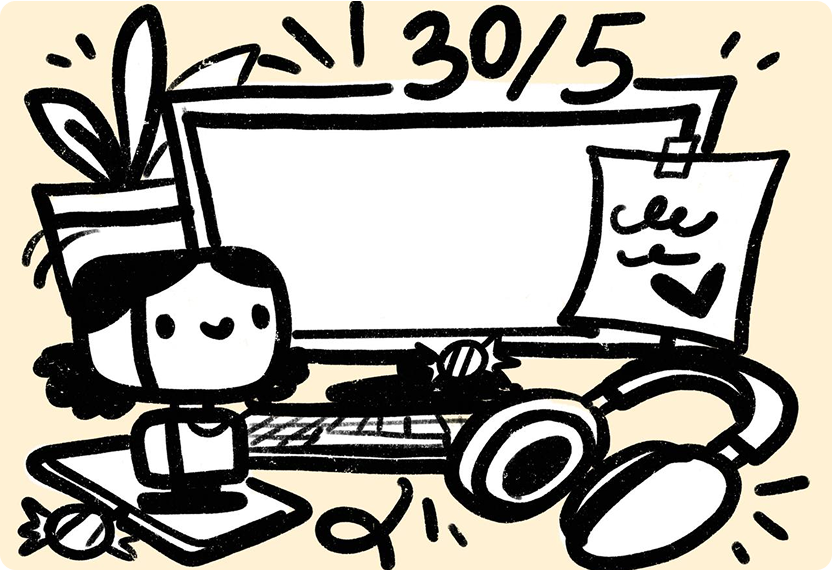
Use a Strategy of Anticipation.
Almost every company has work chats where the latest news, small tasks, and daily issues are discussed. Usually, these messages require attention and responses from the whole team—and that can work to your advantage. Make it a habit to reply to messages early, even if your response is just a couple of words. Your quick involvement in the discussion and willingness to share your thoughts ahead of others will be seen as a sign of high competence and a serious attitude toward work.
As a result, the label of the “quiet, withdrawn colleague” will soon fade away, because your silence in real life now has an explanation—you’re simply a very busy person. In practice, people who reply among the first in chats tend to get fewer minor assignments than those who leave their responses until the very end.
Provide Yourself with a Work Alibi.
If your colleagues love informal socializing and you don’t, that’s perfectly fine. Your goal isn’t to invent elaborate excuses, but to learn how to gently yet confidently assert your personal boundaries.
There’s no need to make up a “second job” or “top-secret project.” It’s much more effective to use simple, universally acceptable phrases:
“Thanks for the invite! I already have plans for the evening.”
“I need to recharge, so I’ll pass today.”
“I appreciate your offer, but I need some time alone today.”
If you like, you can offer an alternative:
“Fridays usually tire me out, but I’d be happy to join you on Wednesday.”
“Geomagnetic storms might turn me into a rabbit, but I’d gladly pop in for half an hour during coffee break.”
Focus on the quality of your work, not the number of social events. After all, your value as an employee is measured by results, not how often you hit the bar.
Sometimes it’s worth going. If you feel up to it, attend briefly. And you’re free to set your own terms: “I’ll drop by for an hour, but then I have another important commitment.”
Find Yourself a Personal Extrovert for Inevitable Meetings.
Sometimes you can’t avoid a work event or business meeting, which means you’ll inevitably be pulled into conversations. That’s exactly when a personal extrovert comes in handy. If it’s a colleague from your company—even better. But even a close friend or acquaintance who loves meeting new people works just fine.
Your extrovert friend will naturally gather the talkative crowd, engage them with conversation, and ask questions, while you can stand nearby, nodding along and showing that you’re participating. If anyone asks why you’re so quiet, you can always explain that you didn’t want to interfere with your trusty friend networking and sharing updates.
The result: you gain respect and recognition while avoiding the main downsides—idle chatter and dubious social fame.
Mission Complete!
The power of introverts doesn’t lie in wearing masks that suit everyone else, but in having the courage to take them all off at once. While the extrovert world is noisy, planning, and postponing “until tomorrow,” you are already taking action. Your silence isn’t emptiness—it’s a space for brilliant ideas. Your attention to detail is a superpower that turns routine into art.
Introversion isn’t a barrier to enjoying work; it’s an alternative path to it. A path not through the noisy crowd, but through the quiet corridors of self-awareness. While extroverts seek energy from the outside, introverts find it in the boundless depths of their own selves.
Harmony begins not when you become convenient for others, but when you finally become yourself. Let your introversion be your greatest professional asset. Love what you do, and do it in the way only you can—deeply, mindfully, and without unnecessary words. The world is waiting for your quiet breakthrough.
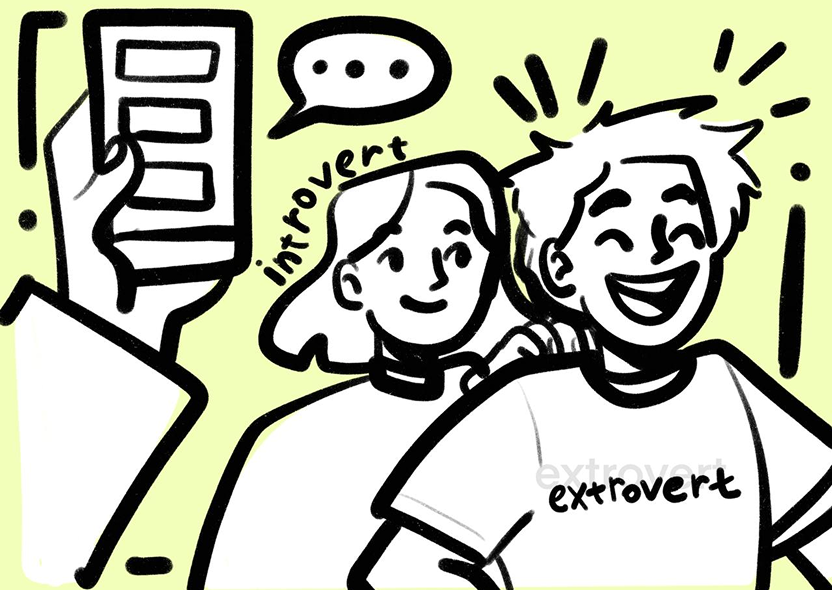
We’ve ventured beyond the boundaries of time and space. By the way, it’s empty there.
Thank you!


